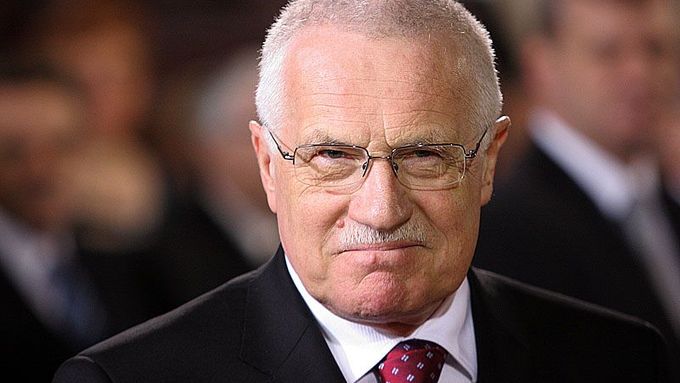Czech President Václav Klaus says in an e-mail interview for Aktuálně.cz that western politicians failed to foresee the global financial crisis because they were preoccupied with global warming. "I am not surprised that their reaction is belated and flawed," he says.
The president opines that the financial crunch has not fully affected the Czech Republic because the Czech crown is partly isolating the domestic banking sector from the rest of the world and because Czech banks have had more conservative lending policies.
The US administration and Congress were at first reluctant to rescue their sinking banks, but now are offering guarantees and financial aid left and right. Do you think it was a mistake to only start helping banks when things got ugly?
I think the US government, the Congress, the central bank, as well as the European politicians are taking populist steps that merely pass the buck and will have little effect. They are trying to appeal to the voters, but I don't believe there is a genuine intention to really improve the institutional framework of the existing market system.
That these officials are only acting now is not very surprising. They were busy with global warming and their futile fight against the climate [change]. That was obviously a much easier and more popular agenda, which helped them ignore today's world and its problems. As a result, they failed to see the mounting difficulties of the banking and financial sector. That is why I am not surprised that their reaction is belated and flawed.
Do you agree with those journalists who liken the present crisis to the beginning of the Great Depression in 1929?
Historical parallels are something to learn from, but things are never the same. The large crisis of the 1930s did not start in mortgages - which is why I think the parallel with the US crisis of 1871 is more fitting. Today's panic is bigger than the actual situation in the global banking and finance sector deserves. Let's keep our cool and let's not adopt measures we would regret in the future - I mean we who don't want more state interventions in economy. Those who wish more interventions are certainly welcoming the crisis with much joy.
Baking sector needs more Thatchers and Reagans
In many countries banks today fully rely on public funding. Will we still be able to talk about capitalism?
The capitalist system has gone through various phases and I believe that we won't see the same degree of nationalization and regulation of private companies and banks that took place after the World War II. But to extricate ourselves from today's phase of state interventions, we will need another Thatcherite or Reaganite revolution. I am optimistic about that.
What will change once the crisis is over?
I don't know what will change, but I know what change I wish to see. I want politicians to start addressing real problems and to forget about global warming; I want them to know that the priority of a free man is freedom and democracy and not a state that dictates his life.
Do you agree with proposals that would increase state regulation of banks?
We first need to get rid of old, bad regulation that significantly contributed to the present difficulties faced by the banking and finance sector. The existing regulation has encouraged banks to comply with the regulators' requirements and, at the same time, to escape to the unregulated sphere of financial derivatives and other innovations.
Today's faith in rationality and unlimited power of regulators is essentially fallacious. It is impossible to comment on the daily influx of proposals for new regulations - we need to wait until they are on the paper.
Czech banks are resisting the crunch. What is the main reason?
It is the Czech crown, which to some extent immunizes our banking and finance system from the rest of the world.
A banking and finance crisis that hit our country in the late 1990s made our banks extremely cautious - unlike some of their parent institutions based abroad - and hence less vulnerable. As much as I found the [late 1990s] crisis unnecessary and politicized, it is paradoxically helping us today.
Also, we never provided such a nonsensical amount of state support for mortgages, which means the total volume of loans is far from being dangerous, despite its massive growth in the past years. It is not powerful enough to trigger any banking or finance crisis.











